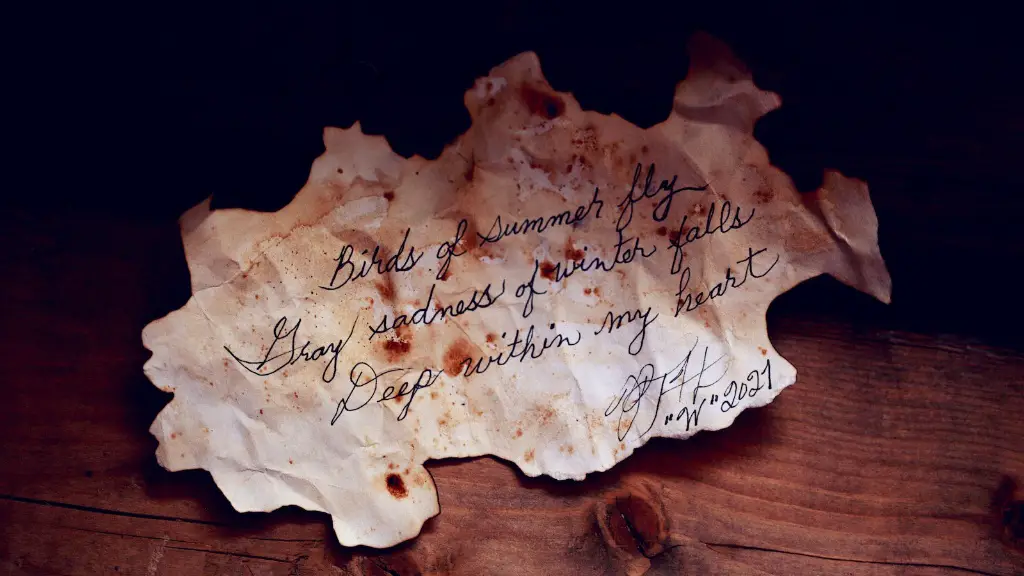Robert Frost’s poem “Birches” could be perceived in a multitude of ways depending upon the reader’s own attitudes and values. The narrative in the poem describes a boy who used to swing among the birch branches. This was used as a representation of the boy’s desire to escape from the worry and stress of his own life, to step away from the ground and reach towards the sky. The poem also portrays a greater meaning of yearning for freedom and a release from the constraints imposed on the boy, be it his own expectations or those of society. It is also possible to read the poem as an allegory of growing old, as the boy finds himself physically unable to climb the birches and swing among their branches as he had done before. While the poem may appear to be quite basic and simple, it is more than just a tale of a children’s game.
The imagery used in the poem greatly contributes to its depth and complexity. The birches are used as a symbol of longing for innocence and youth. The boy is presented as fragile and exposed, indicating a need for protection from the elements and from the world. Frost’s repetition of the word “swinger” indicates the longing of the boy to be removed from his burdens and constraints, and instead to be able to savour his freedom. The poem can be seen as a statement of Frost’s own feelings of being a part of a greater whole, and of being present within the universe in a transcendental way.
Furthermore, the imagery of the arching birches provides the idea of the flexibility needed in order to navigate the realms of life. While offering protection and guidance, the birches suggest a level of strength and resilience in order to reach the sky and then return to the ground. Frost believes that the world is constantly in motion, and it is important to be patient and creative in order to succeed. The boy is learning to make his way in life in the same way a child learns to climb a tree, by testing his strength and by exercising restraint and balance. This is paralleled by the boy ‘s journey of maturity, as he progresses from a childish need for freedom to the depth and simplicity of adult life.
The use of irony and paradox also help to further convey Frost’s message of the never ending cycle of life. Throughout the poem he speaks of the boy’s attempts to hold onto his freedom and to make sense of the natural order of things. In doing this Frost reinforces the idea of the eternal cycle of life, with the boy’s return symbolising the necessary harmony that must be reached in order to achieve a sense of peace. By showing how the birches can provide both physical and spiritual shelter, Frost implies that the boy’s attempts to remain free of the adult’s world can only be achieved if he retains his faith and remains within the ‘arching’ circle of life.
Growing Up and Acceptance
The poem “Birches” by Robert Frost tells the story of a boy’s journey into adulthood and the realization of his need for protection and guidance in order to reach his goals. By using the imagery of birches, the poem manages to tackle many complex topics within a seemingly simple narrative. Frost contrasts the innocence of childhood with the often strict and restrictive nature of adulthood, symbolizing the journey of maturation in a powerful and meaningful way. Through the use of irony and paradox, Frost conveys his message of the cyclical nature of life: In order to appreciate the freedom of youth, one must be prepared to accept the responsibility of adulthood. By emphasizing the importance of balance, and the need to accept the natural progression of life, Frost underlines the meaning of his poem in a powerful and memorable way.
Living and Growing
Robert Frost’s “Birches” is a poem that speaks of the struggle between freedom and responsibility in the face of adulthood. Through the use of intricate imagery and symbols, Frost highlights the fear of losing the innocence and joy of childhood. The story of a young boy attempting to escape his own life in order to reach the birches, reflects a universal struggle between the joy of youth and the responsibilities of maturity. The poem’s message speaks of the need to live life in balance, to accept the passing of time and to reach for the sky in pursuit of our dreams. By emphasizing the importance of finding humility and understanding, Frost conveys the idea that in order to succeed we must learn to appreciate what life has to offer, both good and bad, in order to fully embrace the gifts of life.
Acceptance of Life
The poem “Birches” by Robert Frost is a narrative about a young boy and his attempts to remain within the golden curves of the birch trees and away from the harshness of real life. Through the use of imagery and symbolism, Frost portrays the boy’s desire for innocence and freedom, as well as his need to accept the inevitability of adulthood. The poem speaks of the cyclical nature of life, emphasizing the importance of maintaining balance in order to truly appreciate and live life. Frost’s deliberate use of words and repetition, along with his subtle use of irony and paradox, conveys a powerful and meaningful message: In order to remain free, one must learn to accept the restrictions of the world and the responsibilities of adulthood.
Sin, Innocence and Maturity
The poem “Birches” by Robert Frost speaks to the universal struggle of finding the balance between innocence and maturity. Through the use of vivid imagery and symbolism, Frost highlights the fears associated with growing older and being forced to take on the weight of society’s expectations. By portraying the boy’s journey within the birches as a journey of enlightenment, Frost conveys his message of the importance of accepting responsibility. In this way, his poem can be seen as an allegory for the sin of denying adulthood, as well as the need to find a sense of peace within the harsher aspects of life. By emphasizing the importance of accepting the cycle of life, Frost subtly speaks of the need to accept our human vulnerabilities in order to truly live a meaningful life.
Harnessing the Power of Life
Robert Frost’s poem “Birches” speaks to the power of living life in balance and harnessing the beauty of the natural world. By contrasting the joys of childhood innocence with the responsibilities of adulthood, Frost vilifies the idea of escaping reality and emphasises the importance of accepting one’s place in the world. The use of imagery, repetition and irony underscore the poetic significance of the narrative, further highlighting the notion that in order to find true freedom, one must learn to be humble and accept the sometimes harsh truth of life. The poem serves as an ode to the cycle of life, reminding us that in order for us to truly appreciate our own freedom, we must first accept the limitations of the world and whatever responsibilities come our way.


